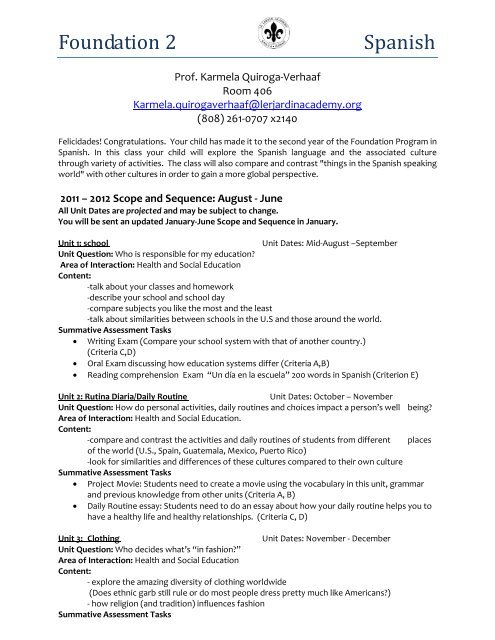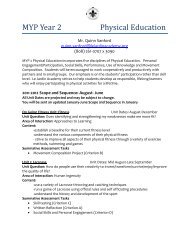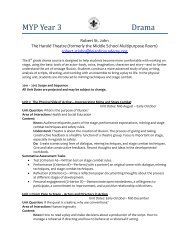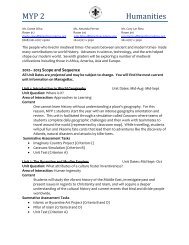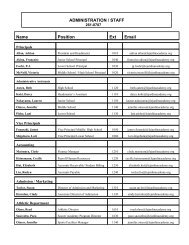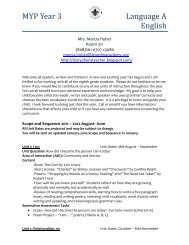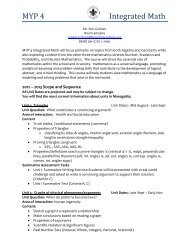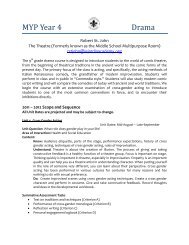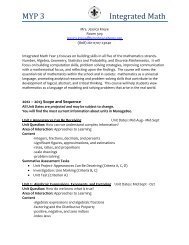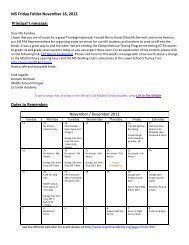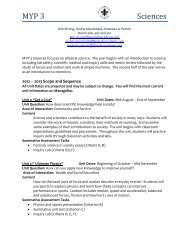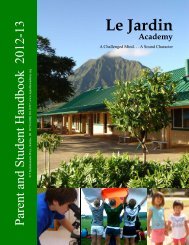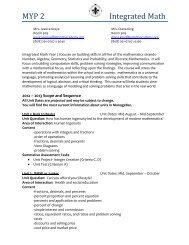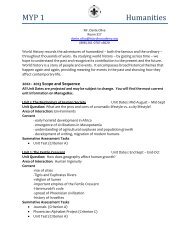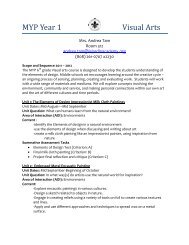MYP Year 5 - Le Jardin Academy
MYP Year 5 - Le Jardin Academy
MYP Year 5 - Le Jardin Academy
You also want an ePaper? Increase the reach of your titles
YUMPU automatically turns print PDFs into web optimized ePapers that Google loves.
Foundation 2<br />
Spanish<br />
Prof. Karmela Quiroga-Verhaaf<br />
Room 406<br />
Karmela.quirogaverhaaf@lerjardinacademy.org<br />
(808) 261-0707 x2140<br />
Felicidades! Congratulations. Your child has made it to the second year of the Foundation Program in<br />
Spanish. In this class your child will explore the Spanish language and the associated culture<br />
through variety of activities. The class will also compare and contrast "things in the Spanish speaking<br />
world" with other cultures in order to gain a more global perspective.<br />
2011 – 2012 Scope and Sequence: August - June<br />
All Unit Dates are projected and may be subject to change.<br />
You will be sent an updated January-June Scope and Sequence in January.<br />
Unit 1: school<br />
Unit Dates: Mid-August –September<br />
Unit Question: Who is responsible for my education?<br />
Area of Interaction: Health and Social Education<br />
Content:<br />
-talk about your classes and homework<br />
-describe your school and school day<br />
-compare subjects you like the most and the least<br />
-talk about similarities between schools in the U.S and those around the world.<br />
Summative Assessment Tasks<br />
• Writing Exam (Compare your school system with that of another country.)<br />
(Criteria C,D)<br />
• Oral Exam discussing how education systems differ (Criteria A,B)<br />
• Reading comprehension Exam “Un día en la escuela” 200 words in Spanish (Criterion E)<br />
Unit 2: Rutina Diaria/Daily Routine<br />
Unit Dates: October – November<br />
Unit Question: How do personal activities, daily routines and choices impact a person’s well being?<br />
Area of Interaction: Health and Social Education.<br />
Content:<br />
-compare and contrast the activities and daily routines of students from different places<br />
of the world (U.S., Spain, Guatemala, Mexico, Puerto Rico)<br />
-look for similarities and differences of these cultures compared to their own culture<br />
Summative Assessment Tasks<br />
• Project Movie: Students need to create a movie using the vocabulary in this unit, grammar<br />
and previous knowledge from other units (Criteria A, B)<br />
• Daily Routine essay: Students need to do an essay about how your daily routine helps you to<br />
have a healthy life and healthy relationships. (Criteria C, D)<br />
Unit 3: Clothing<br />
Unit Dates: November - December<br />
Unit Question: Who decides what’s “in fashion?”<br />
Area of Interaction: Health and Social Education<br />
Content:<br />
- explore the amazing diversity of clothing worldwide<br />
(Does ethnic garb still rule or do most people dress pretty much like Americans?)<br />
- how religion (and tradition) influences fashion<br />
Summative Assessment Tasks
• Reading Exam “Vestir bien nos ayuda a triunfar en la vida” 250-300 words in Spanish.<br />
(Criterion E)<br />
• Written and Oral Exams (Clothing Descriptions) via Fashion Show project (Criteria A, B, C, D)<br />
Unit 4: My Childhood<br />
Unit Dates: January – February<br />
Unit Question: How did you behave when you were little?<br />
Area of Interaction: Health and Social education<br />
Content:<br />
Students will recall their childhood and learn from their past experiences.<br />
-compare the traditional childhood of a child in the U.S. with traditional childhoods in<br />
different Spanish speaking countries<br />
-analyze the expectations that parents have for their children, the maturity level and<br />
responsibility in different societies<br />
-reflect and write about their daily routines when they were young children, and<br />
appreciate what they were and what they had, and see that they can go much<br />
further and that there is no limit in what they want to become.<br />
Summative Assessment Tasks<br />
• Reflective essay. 150 words. How was your first childhood? What was your favorite toy?<br />
And why? (Criteria C, D)<br />
• Analytical essay. 150 words. How do you think you have changed from your 2 nd<br />
childhood? You think that the culture and community affected who you are today? How?<br />
And why? (Criteria C, D)<br />
• Reaction essay. 200 words. Reaction in one topic of the movie, Bajo la misma luna/Under<br />
The Same Moon. Follow by a discussion. (Criteria A, B, C, D)<br />
• Unit written exam - New vocab, imperfect tense and grammar- reading comprehension.<br />
(Criteria C, D, E)<br />
• Unit Oral Exam (Criteria A, B)<br />
Unit 5: Directions<br />
Unit Dates: March - April<br />
Unit Question: Where do you usually go shopping? And how do you get there?<br />
Areas of Interaction: Environments<br />
Content:<br />
-giving directions in Spanish<br />
-explain where they want to go, where they live, where the stores are and what and<br />
how they can find things<br />
-geography of most Spanish speaking countries; their capitals, flags and some<br />
famous landmarks<br />
Summative Assessment Tasks<br />
• Unit essay: 150 words in Spanish. (Criteria C, D)<br />
• Unit written and reading exam. (Criteria C, D, E)<br />
• Project/ presentation: Implementing; writing, new vocabulary, new verbs, reading<br />
comprehension & oral communication. (Criterion A, B, C, D, E)<br />
Unit 6: Building The Future<br />
Unit Dates: April – May<br />
Unit Question: Does The Future Hold a Plan for me?<br />
Area of Interaction: Health and Social Education<br />
Content:<br />
-goal setting; students will explore their future plans<br />
-students will compare their potential futures with the potential futures/ opportunities<br />
of Hispanic children in the USA and in Cuba<br />
-language functions: future tense and the near future tense<br />
Summative Assessment Tasks
• Analytical essay: How do cultural/ethnic heritage affect who we are and the decisions we<br />
make? 150 words in Spanish. (Criterion C)<br />
• Reflective essay: Am I doing something for my future? 200 words in Spanish (Criterion C)<br />
• Unit Exam: Implementing; writing, new vocabulary, verbs in the future tense, reading<br />
comprehension & oral communication. (Criteria A, B, C, D, E)<br />
Unit 7: Accidents<br />
Unit Dates: To be announced<br />
Unit Question: What do you do to prevent injuries?<br />
Area of Interaction: Health and Social Education<br />
Content:<br />
- describe, compare, and contrast health services among the countries of Honduras,<br />
Colombia, México, Perú & USA<br />
Summative Assessment Tasks<br />
• Oral communication: Discussion with a partner/Oral Communicationskills.<br />
(Criteria A, B)<br />
• Unit Exam: Written (Criteria C, D)<br />
• Reading Comprehension Unit Exam (Criterion E)<br />
• Unit Project: Investigation: reading, writing, speaking (presentation).<br />
(Criteria A, B, C, D,E)<br />
Unit 8: Communication<br />
Unit Dates: To be announced<br />
Unit Question: How does technology affect your life?<br />
Area of Interaction: Environments<br />
Content:<br />
-ancient civilizations and their ways of communication<br />
-what and how we have inherited ways of communication<br />
Students will discuss, learn, understand, and appreciate how important is to be able to<br />
communicate with each other and the rest of the world. They will think critically and reflect<br />
about the positive and negative impacts of new technological communication and how this type of<br />
communication changes our lives and our environments.<br />
Summative Assessment Tasks<br />
• Project/ Presentation with an essay of 250 words. (Criteria A, B, C, D,E)<br />
• Unit Exam. (Criteria C, D, E)<br />
Unit 9: Passport<br />
Unit Date: To be announced<br />
Unit Question: What is traveling for you?<br />
Areas of Interaction: Human Ingenuity<br />
Content:<br />
When traveling, we can tailor our holidays according to our individual style, need and<br />
budget. We want our holiday to exceed our expectations from start to finish. Students will arrange a<br />
personalized vacation.<br />
Summative Assessment Task:<br />
• Analytical essay. 200 words. (Criteria C, D)<br />
• Travel Brochure or guide/presentation. (Criteria A, B, C, D, E)<br />
• Unit oral Exam. (Criteria A, B)<br />
• Unit written. (Criteria C , D)<br />
• Unit Reading comprehension exam. (Criterion E)<br />
Unit 10: Extended Family<br />
Unit Date: To be announced<br />
Unit Question: How important is it to know my heritage?<br />
Areas of Interaction: Health and Social Education<br />
Content:<br />
-The more we know about ourselves the more we understand and appreciate others
-Use the preterite tense to communicate past experiences, feelings and thoughts.<br />
-Students will learn about their family heritage and where their grand or great<br />
grandparents are from. Why they are here and what was their goal coming to<br />
this country. What language did/do they speak and are there any traditions<br />
that it were kept in their families.<br />
-Students will also be exposed to the geographical locations of these countries.<br />
-Students will discover the similarities and differences among these cultures and their<br />
own at the moment.<br />
-Students will understand the real meaning of family in different States of the U.S.A.<br />
also the meaning of a Hispanic family in the U.S.A. compared with families of<br />
Venezuela, Colombia and Ecuador.<br />
-Students will explore the cultural practices of countries outside their own. They will<br />
consider how the differences between cultural can affect the way we relate to<br />
our ancestors and the people around us.<br />
Summative Assessment Task:<br />
• Project/Presentation. Analytical essay. 175 words. (Criteria A, B, C , D)<br />
• Reflective essay. 200 words. (Criteria C, D)<br />
• Reaction essay. 150 words. (Criteria C,D)<br />
• Unit written & reading Exam. (Criteria C, D, E)<br />
• Unit Oral Exam. (Criteria A, B)<br />
Unit 11: Special Occasions<br />
Unit Dates: To be announced<br />
Unit Question: How do you celebrate special days with your family?<br />
Area of Interaction: Health and Social education<br />
Content:<br />
-vacation destination: quiet resort/ mountain resort/popular resort/seaside resort<br />
- terms associated with the summer vacation assignments: project/ journal writing/<br />
-weather or plant growing observation<br />
-descriptive words: i-adjectives and na-adjectives; compound adjective conjugation; -past<br />
tense: affirmative and negative statements<br />
-language functions: describing past events; giving opinions<br />
Summative Assessment Tasks<br />
• Compare and contrast essay. 175 words. Compare and contrast. (Criteria C, D)<br />
• Reflective essay. 250 words. (Criteria C, D)<br />
• Presentation: Multiple Intelligences options –Select only one: a) Musical/Rhythmic and<br />
Bodily/Kinesthetic;-write words of a song. b) Naturalist; -uses of internet to find out if there is<br />
an equivalent to Earth Day in Spanish Speaking countries-write an essay –compare and<br />
contrast. c) Visual/Spatial; -write and essay explaining why we should select a holiday in a<br />
specific day that you like. (Criteria A, B, C, D, E)<br />
• Unit written, reading Exam. (Criteria C, D, E)<br />
Office hours in room 406:<br />
Students are encouraged to use office hours to receive extra learning support. These office hours<br />
may be changed due to scheduled faculty meetings, conferences, or unforeseen circumstances<br />
12:00-12:50 pm everyday<br />
3:00-3:30 pm- every day<br />
Gr. 12 students<br />
Seniors who are enrolled in Middle <strong>Year</strong>s Programme courses will continue to receive traditional<br />
percentile based A-F grades so that their transcripts remain consistent.<br />
As the <strong>MYP</strong> does not follow the quarterly report schedule, grades for juniors and seniors will be<br />
reported only for work done in the units that have been completed by the end of the quarter date.
Grades for work done in units that are still in progress when the quarter ends will be reported in the<br />
next quarterly report.<br />
Should you have any concerns or questions, please do not hesitate to contact me or Ms. McNeill.<br />
Thank you.


